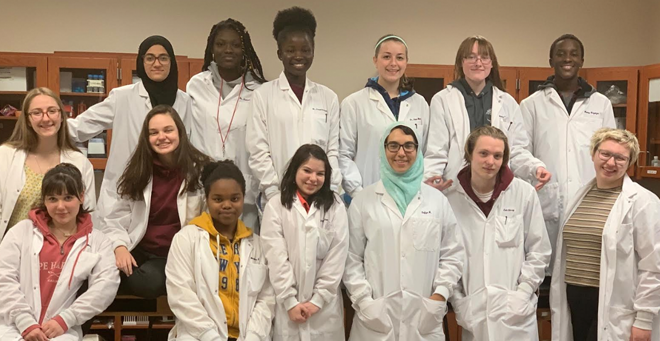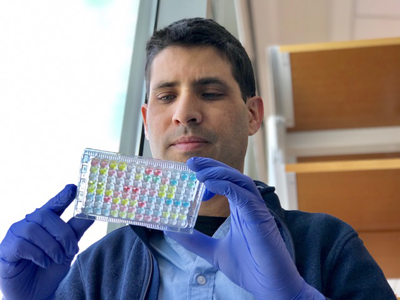
Department took part in the innovative program
developed by Amir Mitchell, PhD.
Under the guidance of Amir Mitchell, PhD, assistant professor of molecular medicine in the Program in Systems Biology, 250 high school students from Massachusetts, California and Israel have had the opportunity to research one of medicine’s biggest challenges today—the emergence of superbugs. While students often learn about strains of drug-resistant bacteria in school, Dr. Mitchell’s innovative program is allowing these students to conduct their own investigations into the phenomenon.
“A lot of times in high school labs, students will conduct a lab that has a known outcome, but not much inquiry goes into that,” said David Mangus, PhD, a biotechnology teacher at Brockton High School whose class participated in Mitchell’s program. “This was an experiment with real decisions and real data involving an incredibly important topic that kept them engaged.”
Mitchell’s lab collaborated with Anat Yarden, PhD, of the Weizmann Institute of Science in Israel, to develop an approach to educate high school students on the emergence of antibiotics resistance through natural selection and rapid evolutionary adaptation.

“We took a drastically different approach than the standard one in order to make science outreach widely accessible, exciting and truly interactive,” Mitchell said. “Our approach builds on robotic automation and interactive internet tools to bridge geographical distances and allow hundreds of collaborators, anywhere on the globe, to run empirical experiments in our lab.”
Mitchell and PhD candidates Serkan Sayin and Brittany Rosener created an online portal that allows students to remotely use a robotic platform in their lab and dictate how to evolve dozens of bacterial strains on various concentrations of different antibiotics over several weeks.
“We soon realized that this platform opens a remarkable opportunity for science education through engagement of high school students in cutting-edge, inquiry-based research on a key challenge humanity is facing today,” Dr. Yarden said.
Students at Worcester Technical High School and at several high schools in Israel took part in the inaugural program last year. This year, Worcester Tech students were joined by peers in Brockton and San Francisco to monitor, in real-time through live video streams on YouTube and the project’s website, how drug resistance gradually emerged. Each class had to make real-time decisions on the drug dosing to use, according to daily observations. To help the students gain a greater understanding of the molecular mechanisms underlying drug resistance, the lab sequenced the DNA of specific genes known to be associated with drug resistance in the clinic. The Mitchell lab also sequenced the entire genome of an evolved, multi-drug resistant bacteria.
Worcester Tech students were able to identify a gene that was mutated and potentially lead to simultaneous resistance against the three antibiotics—ciprofloxacin, kanamycin and chloramphenicol—used in the experiment.
“It was exciting for them,” said Johanna vanderSpek, PhD, head of the Biotechnology Department at Worcester Tech. “This emphasized collaboration as a strength, reinforced what they were learning in the classroom and enhanced their understanding of the research underway at the medical school.”
The project allowed students to conduct inquiry-based experiments and analyze real data in real-time and stressed the importance of communication between parallel groups tackling the same problem.
“This is very much in line with how collaborative academic research actually takes place,” said Orna Dahan, PhD, from the Weizmann Institute of Science.
Dr. Mangus, a scientist for nearly 20 years at UMass Medical School before becoming a teacher in Brockton and launching its biotech department, said the experiment gave his students a real look into the field.
“As a former UMass research scientist, this is really why I got in to teaching: to expose students to the inquiry process. I want to give them the experience of doing science as opposed to just learning about what had happened,” Mangus said.